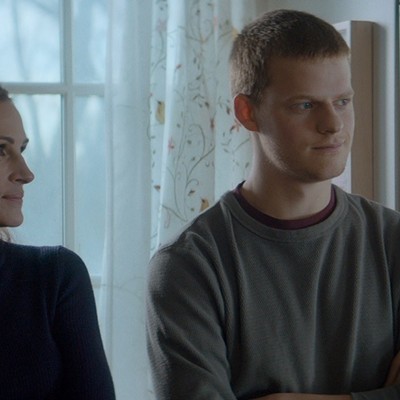Probably the most interesting thing about Tag is that it was inspired by a true story. Director Jeff Tomsic and his team seem to understand this, as both the marketing and the movie itself remind you of its real-life origins on a regular basis. Several grown men have been playing the same game of tag for the last three decades, spending one month each year doing everything they can to avoid one another, while also doing everything they can to secretly find and touch one another. It is, indeed, kind of incredible. And knowing that it’s a true story — a point emphasized by both the film’s opening and closing titles as well as the odd presence of a journalist character following our heroes around — I couldn’t help but spend much of the movie wondering about the actual mechanics of how such a game would work in real life?
Is that a problem? Yes and no. Glossy studio comedies tend to have fairly low suspension-of-disbelief settings. The Other Guys, Step Brothers, Blades of Glory: These are not movies whose setups or plot mechanics I want to interrogate; so long as the laughs come reliably, I’m good. The laughs come reliably in Tag, too, but, knowing what I knew, I often found myself wishing I were watching a documentary about the actual guys instead. (This is a problem that the recent release American Animals — which is decidedly not a comedy, but is also based on a wild story about a bunch of guys doing something stupid — tries to get around by making itself a narrative-documentary hybrid. That’s an interesting approach, but that film has all sorts of other problems I won’t get into here.)
Still, even with the voice inside my head that wanted to know more about the real-life arrangement behind Tag, I found plenty to enjoy in much of Tomsic’s comedy. The film gets a lot of mileage from bouncing its otherwise disparate characters off one another. There’s Bob Callahan (Jon Hamm), CEO of an insurance company, able to turn on the chummy charm whenever he wants to. When we first meet him, he’s being stalked by intensely nebbishy Hogan Malloy (Ed Helms), a veterinarian who is actually willing to get a job as a janitor at Bob’s firm just so he can nail him in the middle of a big Wall Street Journal interview. There’s Chili (Jake Johnson), a scruffy, dead-end stoner whose life appears to have mostly fallen apart over the years, and yet who’s still willing to put his body on the line for a game of tag; and Sable (Hannibal Buress), who has become completely suspicious of anything and everything thanks to their ongoing bizarre infantile ritual.
The elusive fifth member of the group, Jerry (Jeremy Renner), whose impending wedding serves as a motivation for the crew to reunite, remains in a class all his own. No one has successfully tagged Jerry in all the years they’ve been playing the game, and it’s easy to see why. Whenever he shows up, the film launches into hyper-stylized, slo-mo Guy Ritchiesque action set pieces in which Jerry brilliantly calculates things like velocity and positioning and then, dexterously and with superheroic ferocity, gives his pals the slip. (The knowledge that Renner’s arms had to be replaced with CGI in post-production after he broke them during shooting somehow makes these scenes even funnier.)
Renner is perfectly cast here, as a self-important little slickster who feigns chill while demonstrating Osterman Weekend-levels of paranoia behind closed doors. Actually, everybody’s well-matched to their parts. Hamm is at his backslapping best, as a smiling, friendly, chatty guy who’d secretly sell his mother to gain an edge. Helms is doing a variation on the earnest, taking-things-too-far klutz routine he’s perfected over the years, but he connects with Hogan’s desperation; there’s a reason why he’s the character who’s eager to bring everybody back together.
This indulgent little game has prevented these men from growing up in other ways. In the opening scenes, we see our heroes as young kids, sprinting through a school hallway trying to tag each other, ignoring the girls who observe them with bewilderment and a little disgust. The filmmakers occasionally pay lip service to these men’s complicated, regressive relationships with women, but this idea feels mostly sidelined until the end — not unlike the women themselves. Bob and Chili have a long-festering romantic rivalry over a fellow classmate (Rashida Jones), which reignites when she shows back up in their lives, newly single. Hogan’s wife Anna (played hilariously by Isla Fisher as an intense, tough-as-nails spitfire) has effectively become part of the crew, but she’s still not included as a tagger. Meanwhile, a Wall Street Journal reporter (Annabelle Wallis) is Tag’s literal tag-along, along for the ride to watch these men’s behavior in the wild, but she’s given almost nothing to do.
It all feeds into a broader problem, which is that Tag doesn’t know what kind of movie it wants to be. It wants to indulge in the childish spectacle of grown men playing a high-stakes game of tag — which it does rather well for much of its running time — while trying to point out the shortcomings of doing such a thing with your life. But then it pulls back, as a sentimental revelation at the end sends it into a whole other territory, celebrating the camaraderie this game has fostered among these men.
It’s not impossible to juggle such seemingly conflicting impulses: I was reminded at times of The World’s End, Edgar Wright’s masterpiece about some old friends who have gone their separate ways in life being reunited by an attempt to recreate a legendary pub crawl from their youth. But Wright was smart enough to turn his boys-being-boys blowout into a gonzo sci-fi comedy about the seductiveness and destructiveness of nostalgia; he embraced the contradictions and went nuclear with his story. Tomsic and his team do no such thing. It feels like they’re determined to remain more grounded and realistic — which is absurd, because no matter how much they remind us that this is all based on a true story, at heart Tag is still a dumb, goofy Hollywood comedy with big stars running around making glorious asses of themselves. It’d be a pretty good one, too, were it not so afraid to embrace its essence.
Support Us
Houston's independent source of
local news and culture
account
- Welcome,
Insider - Login
- My Account
- My Newsletters
- Contribute
- Contact Us
- Sign out
Tag Is Often Pretty Gloriously Dumb, So Too Bad It Also Seems to Want to Be More
Bilge Ebiri July 10, 2018 4:00AM

The cast of disparate characters in director Jeff Tomsic's Tag, a film inspired by a true story, includes (from left) Ed Helms, Hannibal Buress, Jon Hamm and Annabelle Wallis.
Courtesy of Warner Bros. Pictures
[
{
"name": "Related Stories / Support Us Combo",
"component": "11591218",
"insertPoint": "4",
"requiredCountToDisplay": "4"
},{
"name": "Air - Billboard - Inline Content",
"component": "11591214",
"insertPoint": "2/3",
"requiredCountToDisplay": "7"
},{
"name": "R1 - Beta - Mobile Only",
"component": "12287027",
"insertPoint": "8",
"requiredCountToDisplay": "8"
},{
"name": "Air - MediumRectangle - Inline Content - Mobile Display Size 2",
"component": "11591215",
"insertPoint": "12",
"requiredCountToDisplay": "12"
},{
"name": "Air - MediumRectangle - Inline Content - Mobile Display Size 2",
"component": "11591215",
"insertPoint": "4th",
"startingPoint": "16",
"requiredCountToDisplay": "12"
}
,{
"name": "RevContent - In Article",
"component": "12527128",
"insertPoint": "3/5",
"requiredCountToDisplay": "5"
}
]
KEEP THE HOUSTON PRESS FREE...
Since we started the Houston Press, it has been defined as the free, independent voice of Houston, and we'd like to keep it that way. With local media under siege, it's more important than ever for us to rally support behind funding our local journalism. You can help by participating in our "I Support" program, allowing us to keep offering readers access to our incisive coverage of local news, food and culture with no paywalls.
Trending Film
- International Film Festival 2000
- It’s Sadly Kind of Perfect That New Season of GLOW Is Stolen by Marc Maron
- Made in Houston
-
Sponsored Content From: [%sponsoredBy%]
[%title%]

Don't Miss Out
SIGN UP for the latest
news, free stuff and more!
Become a member to support the independent voice of Houston
and help keep the future of the Houston Press FREE
Use of this website constitutes acceptance of our
terms of use,
our cookies policy, and our
privacy policy
The Houston Press may earn a portion of sales from products & services purchased through links on our site from our
affiliate partners.
©2024
Houston Press, LP. All rights reserved.




